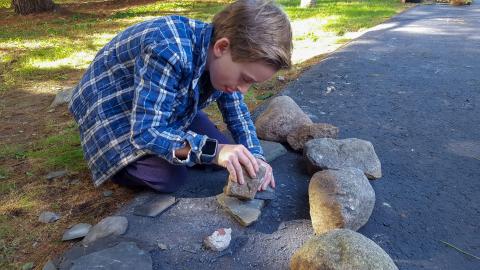This is a confession: It took me many, many years to learn how not to pounce and use what are called "teaching moments" at home with my own children and here at school.
Like most people, I like to tell stories, to talk about things that I know and find interesting and to pass on my skills to others. Most of us do it all the time to the people we interact with closely, our elders, our peers and especially to children. This makes life in a group interesting and exciting. And that is how we all learn a great deal about new ideas and new ways of thinking or doing things. Seeing others is so fascinating because that is how we enlarge our understanding of the world. It is a natural aspect of the human communal experience and it is the greatest way to acquire knowledge.
However, this is all fine until adults start to impart their knowledge to children before they are asked for their input. While teaching works like magic when a person asks for information, it is toxic and disruptive when the adult seizes the moment to teach a child something without the child's consent. A story will illustrate what I mean:
I was at a park and saw a dad with his two boys aged about two and four playing with a toy that is a tiny tots baseball game. It is basically made of a stand on which a plastic baseball is perched on a pole that's just the right height for a child to hit. The kid uses a bat to hit the ball off the pole. It is a great improvement on the situation where the parent pitches, the child misses and the latter is furious with the parent for being so inept at aiming the ball perfectly into the child's flailing bat. (I wonder why I didn't invent this game while raising my kids. It would have saved us lots of frustration.)
The kids were having great fun hitting the ball, missing often but hitting better and better all the time. Then the dad decided that it was time to seize the moment and teach the four year old to hold the bat properly, namely the left hand on the bottom of the right (or vice versa, I can't remember). The kid refused to change his hold of the bat, the parent nagged. The kid got cranky and the dad told him he was stubborn and proceeded to grab the bat from his boy and whack the ball powerfully to the end of the field. He said: "You see how good I hit? That's because I did it right!" The child felt bad and quit playing.
I watched the whole scene and was sickened. This kind of interaction between adults and kids is the norm. It happens all the time everywhere. At home and at school. It was obvious to me that instead of being a teaching moment and an opportunity for learning, these incidents close the children to the world and make them turn off their curiosity, narrow their horizons and teach them to avoid advice from others.
Yet, adults are the great teachers of the young and it is our job to learn when to help and impart our knowledge and when to stay out of the way. What helps me decide how to act, and it isn't fool-proof by any means, is to tell myself that as long as I behave towards children in the same manner that I behave with adults I will not bother them. Here at SVS the students ask us questions and seek advice all the time, and we have to be ready to answer them, but we should not take the initiative, and enforce our great expertise on them without their consent. To do that is counterproductive and toxic.
This post first appeared in the Sudbury Valley School Journal, volume 29, no. 1, October 1999.
SoundCloud artwork by Greer Gleason, student


